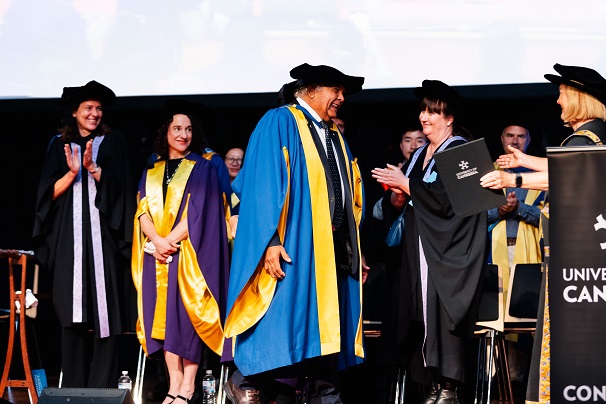Suzanne Lazaroo
30 September 2024: The University of Canberra has awarded former Chancellor Emeritus Professor Tom Calma AO with an Honorary Doctorate, in recognition of his distinguished career as an advocate for social justice and for his outstanding leadership, both at the University and in the national arena.
Professor Calma’s award formed part of the University’s September round of graduations held last week.
“I have received several Honorary Doctorates in my life, but this one is particularly meaningful,” Professor Calma said. “I spent 15 years of my life at UC, and I have always held it in very high regard. To be recognised this way by my peers is an honour and a privilege.”

An Aboriginal Elder of the Kungarakan people and member of the Iwaidja people, Professor Calma joined the University Council in 2008, and was appointed Deputy Chancellor in 2012.
He donned the mantle of Chancellor in 2014, becoming the first Indigenous man to hold the role at an Australian university. As Chancellor, he led the University in its mission to become a values-led institution, with accessibility to education and equal opportunities always in the forefront.
Professor Calma was a driving force behind the University’s Stretch Reconciliation Action Plan (RAP) 2021 – 2024, which includes aims to enhance education outcomes for Aboriginal and Torres Strait Islander students and Indigenise the curriculum.
He received the Honorary Doctorate at the University’s first Faculty of Health ceremony.
“This also holds particular significance for me, because of my background in health research, advocacy and policy – and the fact that I have graduated more students from UC’s Faculty of Health than any other,” he said.
Addressing the assembled graduates, Professor Calma spoke of their “potential to shape our world in profound ways, from birth to death” – and drew on wisdom built over decades as he imparted some words for the future.
“Embrace integrity in all that you do – that will define your legacy,” he said. “Holding fast to your ethics, honesty and principles is what will set you apart.
“Embrace collaboration, curiosity and creativity, and commit to lifelong learning. We are ever evolving, and staying ahead will require that commitment.
“And don’t ever be a bystander in the face of injustice.”

The Honorary Doctorate joins a very long list of honours recognising Professor Calma’s five decades spent championing change and social justice, policy reform, cross-cultural understanding and education for all, particularly for Aboriginal and Torres Strait Islander peoples. These include an Order of Australia award in 2012.
His influence has been felt across wide-ranging sectors, including health, education, training, employment, aged care, and economic and social development.
An academic and in the tertiary education sector since 1980, Professor Calma also served as a senior diplomat on Australian missions to India and Vietnam, from 1995 to 2002.
Just a few of his key national advocacy roles – historical and current – include as Co-Chair of Reconciliation Australia; Aboriginal and Torres Strait Islander Social Justice Commissioner at the Australian Human Rights Commission; and Race Discrimination Commissioner.
Professor Calma was instrumental in the establishment of the National Congress of Australia’s First Peoples; worked on developing the inaugural National Aboriginal and Torres Strait Islander Suicide Prevention Strategy; and has tirelessly promoted justice reinvestment, a community-led approach aimed at preventing crime, addressing the drivers of contact with the justice system and improving justice outcomes for First Nations peoples.
In 2005, Professor Calma published the Social Justice Report on Indigenous Health Equality. It was the catalyst for the Close the Gap campaign, which saw governments committing to eliminate this inequality within a decade, and he became Chair of the Closing the Gap Steering Committee.
In October 2019, Professor Calma was appointed Co-Chair of the Voice to Parliament co-design process, and championed the enshrining of a body in the Australian Constitution that would enable Aboriginal and Torres Strait Islander people to provide advice to the Parliament on policies and projects that impact their lives.
In November 2022, Professor Calma was voted the ACT Senior Australian of the Year 2023 – he went on to become Senior Australian of the Year 2023. Also in 2022, he became the first Aboriginal Fellow of the Australian Academy of Science.
And on 21 September, Professor Calma was announced as the recipient of the ACT Chief Minister’s Rotary Peace Prize, which is awarded to an individual, or group, who has contributed to a more peaceful community – locally, nationally and internationally.
While he retired as University Chancellor at the end of 2023, Professor Calma remains a keen supporter of the institution he spent so many years at – and a stalwart in the tertiary education sector, as a member of the Australian Universities Accord Implementation Advisory Committee.
He is also a Professor of Practice and member of the Senate at the University of Sydney, an Adjunct Professor at the University of Queensland, an Adjunct Associate Professor at the Australian National University and Honorary Professor at Macquarie University.
Attending last week’s ceremony was a homecoming of sorts for Professor Calma – graduations were always one of his favourite parts of the Chancellor role. Even double knee replacement surgery in 2017 could not keep him away – he simply scheduled it around graduations.
“I am very happy to get to be at another of UC’s graduation ceremonies, which have always been a highlight for me – I graduated over 37,000 grads in my time as UC Chancellor – including my own daughter Alice, who received a Bachelor of Educational Studies in 2017,” he said.
“There is so much meaning at the ceremonies. It’s about recognising the students, both domestic and international, who have dedicated these years of their lives to study – seeing the relief and pride on their faces, and the pride of their families and loved ones.”


